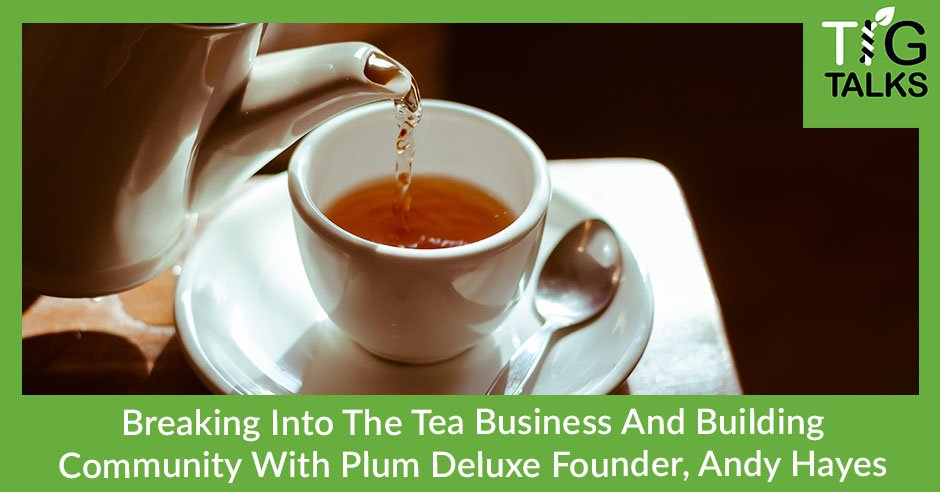How does one get into the tea business? Here to share his story is Andy Hayes, Founder and Creator of Plum Deluxe and Plume Deluxe Teas. Plum Deluxe is a community for friends and family who enjoy life’s luxuries, big and small, and they connect through flavorful tea! Andy chats with host Elliot Begoun to share how he fell in love with tea and the culture behind it with stories of travels from around the world. Drawing inspiration from these experiences, he was able to build a business and a community. In this episode, Elliot imparts strategies he used for his business, from creating a brand to attracting the right customers. Don’t miss out on business and industry insights from Andy and get a deeper understanding of the impact of community for the success of your business.
—
Listen to the podcast here
Breaking Into The Tea Business And Building Community With Plum Deluxe Founder, Andy Hayes
For those of you who read regularly, you now know the MO. I start with these two commercials but they are not commercials. They are more me trying to make sure that there’s a growing awareness of two of our important initiatives that can greatly impact our industry, and that was why they were developed. The first is our TIG Collective.
Our challenge in this industry is twofold as it relates to board members and advisors. From the entrepreneurial side, putting it bluntly, too many of our entrepreneurs simply collect advisors like vanity plates to put on decks without understanding how to pick the ones that they need and the season that they are in and how to derive the most value from that interaction.
The second thing is the boards for most of our brands. They look too much like me. Middle-aged White dudes. I’m now almost past middle-aged. That needs to change because the communities that we are serving were multicultural and very diverse. If our boards don’t have that field of view, if they don’t have diversity, lived experience, cultural experience, and so forth, then we could be missing opportunities to be better brands and businesses.
The TIG Collective was established to help both. Brands that are interested simply sign the typical advisor agreement and issue their advisor options but instead of it to an individual advisor. They issue it to the collective. On the side, we have advisors who sign advisor agreements and reciprocal agreements, not between themselves and the brand but with the collective.
All of the options that go into the collective, the advisors share in the aggregated upside that is pooled there. Everybody is rowing the boat in what is in the best interest of those entrepreneurs, both sides the best, etc. We are connecting them and helping them support the entrepreneurs based on the season or the moment in time when their expertise can be of the most value.
While we are doing that, we are conducting master classes helping to give these advisors who we see representing a very diverse group, women, BIPOC, LGBTQ+, and just diversity of thought and lived experience and so forth. Giving them the opportunity to hone the craft of being an advisor and a board member holding master classes on issues like governance, fiduciary responsibility, and coaching.
On the brand side, helping entrepreneurs organize and structure in a way that can help them extract the most value from advisors. If you are interested in this either if you are an industry expert that has a lot to give to entrepreneurs or an entrepreneur in this space, you should be. You should get off your you know what, and take action here. Reach out to us at TIG Brands, and we will hook you up and get you set.
The second commercial is around our TIG Venture Community. The alarm bells are going up. This is getting harder. The capital markets are tight. Most of the funds, and I’m not saying all of the funds, are being more cautious and slower to make investments. They want brands that have derisked that have proven more and gotten further. All of that is fine and understandable but it puts a lot of the emerging brands, those in that seed, to the Series A stage, in a situation where it’s difficult for them to fund their growth.
The other reality is that, as an industry, let’s be real. There are a lot of fantastic brands out there but many of them aren’t truly venture-backable. They are not going to be $100 million or $200 million brands in the next five years. They could be $20 million or $30 million brands with strong EBITDA positivity and cashflow positivity, and we need to find a way to fund those.
We need to stop stepping over good brands and good businesses to find the unicorn, and we are trying to do that with the TIG Venture Community to not only fund these brands but to prove a model to investors that it makes sense to fund these brands. We are doing it through a rolling fund, which gives a lot of LP flexibility. It’s a very different approach. We are also doing it in the way we structure the terms and the use of both debt and equity.
This is a direct call-out. We need more investors to come with us, alongside us, and be a part of this and help brilliant entrepreneurs like my guest, Andy, and fund the businesses as they continue to grow and grow smartly. If you are interested in learning more about the TIG Venture Community, the TIG VC, please reach out to myself or any member of TIG Brands.
Andy, I want you to do your own introduction because I always find that when I do the introductions, it doesn’t resonate as much. It’s not as authentic, and then I can chime in with mine but I have Andy Hayes with Plum Deluxe, an emblematic entrepreneur for everything that we stand for at TIG Brands. We are really excited to have this conversation. Andy, please introduce yourself, your brand, and what you do for our readers.
Thanks for having me. My journey with Plum Deluxe started when I was living in Europe, and you got back from Portugal. A lovely trip with your dad. Sometimes it’s interesting synchronicity. I’m Andy Hayes, Founder, and Creator of Plum Deluxe Tea. We are a loose-leaf tea manufacturer and a community-led brand based in Portland, Oregon.
We sell direct on our website and in a small but growing list of retailers, over 150 different flavors of loose-leaf tea. Think like peach, mango, and dessert flavors, with no sugar, nothing artificial, and none of the weird stuff. It’s delicious. As I was alluding to in my first comment, I used to live in Europe. I lived in the Netherlands and Scotland, and I fell in love with tea culture, which most people know is a little different than American tea culture. A lot of the things that we do at Plum Deluxe are very inspired by the way tea is made and presented, and thought about in a European view in the American market.
Having that sense, having that enjoyment of tea and the tea culture, and noticing its relative absence in the US, there’s a pretty big gap between sensing that, taking action, and starting a business around it. How did you close that gap? What made you decide like, “There’s a business here.”
It’s interesting when I meet other people who work in tea. Everyone says the same thing that the tea found them. They didn’t find the tea. I was falling in love with that cafe culture. The conversations. You said something about it to me one time about tea having that feeling of being around a fireplace, around a campfire. It’s people gathering in a small circle, and I always fell in love with that.
Tea Business: Tea just has that feeling of being around a fireplace, around a campfire. It’s like people gathering in a small circle.
I found myself. When I left Europe, I ended up moving back to the States. I’m American, as you can guess from my accent. I was doing a lot of soul-searching about what I wanted to do because I had been working mostly in large corporations and had gotten acquired twice. The company that I worked for got acquired by an even larger conglomerate. I was feeling very disillusioned with falling in love with an employer or a job that I liked, and then it would get taken away. I was doing a lot of soul searching about like, “What could I do that would be different? Could I do something on my own?”
I was doing a little bit of consulting because I used to work in software. I was doing little things on the side but nothing super meaningful, trying to find the thing. I was working with someone, a freelancer. We were both working on a specific project, and this person was also helping me. I had a blog at the time. I had a blog for years, writing about my travel adventures, mindfulness, and posting photos.
This was when people used to post a photo on a blog instead of on social media. You would post on your blog first. I would write interesting things I was thinking about while I was looking at this beautiful view or some mindful thoughts. I had someone, a freelancer, helping me produce content, update the site, and things like that. We were working on a school project, we thought. This person was working at a tea cart on the weekends as another side gig. Freelancers all have all these side gigs.
We were trying to figure out how to monetize the blog and realized that if you are an affiliate or running Google Ads, the publisher side is called. You have those little ads that pop up randomly. You have to have a ton of traffic to make any money to pay a mortgage. It’s tons of traffic. If we sold products, we would be rolling in money. I have learned a lot about that statement over the years.
I was like, “That would be cool. What would we sell?” It dawned on me. I was like, “You work at a tea company, and we are talking about mindfulness and trying to trigger thoughtful conversation.” Don’t those two things go together? I said, “Ask your boss if she would help me with this project. I have some great ideas.” Teas that I missed that people don’t sell here. Things I think would be cool. My freelancing friend asked the tea lady with a tea cart, which was on the opposite coast. I was in Oregon, and this person was in Pennsylvania.
My friend is like, “I have this friend who wants to do some tea stuff. Would you be interested in mentoring him?” She said, “Have him send me his recipe ideas. If they have merits, I will help him.” I wrote down four different recipes that I thought would be cool. I sent them to her, and she said, “You are going to be amazing. I will help you get this started.” She was the one who taught me a little bit about how to source ingredients and make things. Me being a software person was able to get a website up and running to sell and promote them, and that’s how it all started. I started with four teas, and that’s it. That was all I had in the beginning.
It’s always interesting to me how these things evolve. In every one of these conversations and all my experiences, there’s a little bit of serendipity in it. There has to be. It seems like things line up and develop for reasons that are unexplainable. Like the universe is conspiring against us having any type of normal life. We are damned and doomed to be entrepreneurs. We can’t help it because it is what it is.
We laughed briefly when you said, “If we could sell a product, we can be rolling in the dose.” What have you learned about that? What have you learned about going from being somebody who was sharing content and trying to figure out how to monetize it to being an eCommerce data or digitally-native business taking that level of step? What have been some of your takeaways?
I like to think of it as building a castle or house. I like to think of a castle because it sounds cool. It sounds magical or interesting. There are all these different bricks that you need to do. If you are building a house, you need plumbing and electrical. Running an eCommerce business or having a ton of moving parts.
Tea Business: Think of it like building a castle or building a house. There’s all these different bricks that you need to do that.
I hear people say, “You sell it direct-to-consumer. Cut everybody out.” It’s like, “Sure. Go for that. Let me know how that’s working out for you.” There are a lot of moving parts. The first thing I had to learn is that your food is manufactured. Even if your food is not processed, it still needs to be sourced, packaged, and shipped wherever it needs to go.
You need to have the appropriate food safety controls in place. I had to learn all that. That was an eye-opener. I never thought about even tea, coffee, sugar or things that seemed quite simple. There are steps involved to get them into your kitchen covered that you may not have thought about. I was learning all that in my basement. I started in my basement.
Why is every entrepreneur started in the basement? I don’t get that. I live in NorCal, and nobody has a basement, so it’s the garage. It’s always the garage and a basement.
It depends on where you live and which one you get.
It’s never the spare bedroom or the family room. It’s always the darkest, coldest, and least appealing place in the house. It’s like a secret laboratory. I don’t understand that.
I even had a workshop in the basement, which was a cool place to work. That was the first thing, and then the second thing is that you must get the word out. The thing that I have learned over the years about getting the word out digitally is that landscape changes all the time. As we speak, Twitter, a large social media platform, is going for a giant revolution of how that’s going to work.
Over the years, when I started, you could have a Facebook page that had organic reach, and people don’t have that anymore. You have to use ads. For many years, lots of people have used Facebook ads to find their customers, and Facebook ads don’t work that well anymore. It’s a constantly changing landscape that’s something that can be very difficult too.
As soon as you feel like you figure it out nowadays, things change. As soon as you feel this work gets repeatable, you repeat it a few times, and then something changes. That is a challenge. I know you, and I have discussed that. It’s something I would love to explore with a little bit more depth with you because you have taken less traditional or a little bit out-of-the-box thinking in your approach to reaching your community, whether it’s your catalogs. How are you managing to stay on top of that change and institute some of these plan Bs, Cs, Ds, and Es?
When I started, we were very reliant on all the organic traffic. SEO was easy. Facebook and Instagram reach was “easy,” and then that got taken away. We learned our lesson not to trust any of these tech providers. The way I like to look at things is if you have something that’s working well, you should lean in but you need to remember that if you are leaning in too far and something happens to that, you are going to fall in your butt. You need to have at least one other thing that’s working decently well, even if it doesn’t have the volume, preferably 2 or 3. We are always looking at having an alternative plan.
Tea Business: If you have something that’s working well, you should lean in. But you need to remember that if you’re leaning in too far and something happens to that, you’re gonna fall on your butt.
It’s diversifying a portfolio like a stock portfolio. You can’t have so much concentration in 1 way or 1 element because if something happens that door gets closed, you are putting the business at risk. You have to have that growth hack mindset where you are constantly iterating and trying new things. You don’t have to do it in a big way where a lot of money goes flying out the window but you need to be constantly trying to establish new ways to intersect with the consumer. The things that are working, you lean in until they stop working, and once they stop working, you have 2, 3 or 4 other alternatives to lean into until it stops working.
Another important thing is being connected with other people who are in either your specific niche like if you sell nut butter and organic foods or if you are in eCommerce, because you can get a pulse on what’s happening. One thing that’s important to know is to use the Facebook example. “Are Facebook ads not working for me or are they not working well for anybody now?” If it’s you, that’s your new problem. Maybe it’s your product, pricing or website checkout isn’t working. If it’s happening to everybody, then you have a better sense of what your next step should be.
That’s important advice. Not at the risk of embarrassing you but using you as an example. When we first started chatting, one of your questions was trying to understand from somebody else’s perspective, “Is this a business that’s got the opportunity?” When we jumped in, lifted up the hood, started digging in, and saw the brilliant business that you’ve built and all the things that you are doing so well, one of my takeaways was sadness. A sadness that in the absence of having a bigger and broader community, as entrepreneurs, we tend to suffer a lot from Imposter syndrome and tend to wonder if we are doing things the right way and so forth.
Nobody was giving you the reinforcement that you deserved, that you had earned, that you had built something incredible and something special. To use Andy’s example, if you are sitting there building a business and you are wondering, “Is this a business or hobby? Do I have my shit together or not?” get out there and be a part of a broader community of entrepreneurs. You will see things that you should be doing better or differently but also see all the things that you are doing.
This is a hard journey, and it can be isolating but one of the ways that isolation can be difficult and damaging is when you are left alone with your own fears and doubts, and you begin to believe your own self-narrative. That takes away the enjoyment of the journey but it also lowers the efficacy of you as an entrepreneur if you are coming to work doubting yourself regularly.
It doesn’t help, as the founder of a business, one of your main jobs is solving problems. That’s what you do. People come to you with problems, and you solve them. Sometimes they can feel like, “That’s all I do is solve problems.” It’s like, “Sorry. That’s what you are supposed to do.”
I use this analogy, and it came to me not that long ago. I was talking with another founder about this, and you are heads down in your business day to day. Solving those problems and fighting the fight. It’s hard to look up. It’s like being a parent of young children or a parent to a puppy or a kitten. When they are living under your roof, it doesn’t seem like they are growing that fast or changing that fast. When you see them with intermittency and not as frequently, you are struck with the, “They are growing like weeds. The pace of change is so quick.” That’s what we struggle with.
When we are in our businesses, heads down and working in our business, we lose sight of the progress that’s being made. When you don’t have sight of that progress, the fact that you are constantly fighting fires and solving problems often leads to a belief that there isn’t much movement happening and there isn’t much progress.
Find a way to look at your business from a beginner’s mind standpoint. Look up instead of working in your business, work on your business every once in a while, and notice the progress that’s being made. One thing that I would encourage everyone reading who’s an entrepreneur to do is to keep a journal. A regular journal about this ride you are on.
When you have that moment, write in there the questions, doubts, and fears that you are having, the status of the business, and things like that. When you flash forward 1 or 2 years from now, you can go back and flip to an entry from twelve months prior. Immediately almost viscerally, understand how much you’ve moved the needle. That’s so helpful because, in the absence of it, it’s a grind.
When I reflect back, I think about how small my problems seemed back then, even though I remember them feeling like giants at the time.
The same will be true with the problems and the challenges that you have now. This is vernacular semantics but another thing that I would encourage everyone to do is to replace the word problems with either challenges or opportunities. Problems are negative. Challenges and opportunities are what we face because that’s what entrepreneurs do best.
When they are confronted with things that have stopped working or things that aren’t going in their favor, it’s not that it’s a problem. It’s an opportunity to do something different. It’s a challenge that, if we can find a solution to, we could use to leapfrog the business. I know it seems silly and maybe a little bit woo-woo to think that way but it’s not. It’s a mindset. We want to welcome those opportunities and challenges because that’s where learning is. That’s where progress comes from.
It’s also what I believe entrepreneurs are made to do best. I may be dating myself again but there used to be those posters and t-shirts of Where’s Waldo? Most people will look at one of those things and can’t find Waldo but entrepreneurs tend to look at those things and go, “Waldo is right there.” We can pick it out. We can see we are good at that, and that’s why we are doing this.
Welcome them and view them as challenges or opportunities versus problems. Let me ask a question about the future of Plum Deluxe. I want to get your sense of if you and I are having another one of these conversations on a show, let’s say, five years from now. What’s happened with the business? Where have you taken it?
The big thing that we are focused on going forward is retail. When I started, no one told me about distributors and brokers. I didn’t even know that there were three PLs you could send your stuff to and ship them. I thought you had to build all that yourself. I didn’t know, which worked in my favor in most cases, but the business as it stands now, it’s very much us.
We import, package, ship, and market it. We don’t work with very many external parties to get our product out into the world. One thing that I have learned is taking a lot of time to understand our customers. We have a lot of customers who live in a small town, and there’s no tea shop, that’s why they buy them online.
A lot of people prefer if our teas were in their local general store so that they can go and get them when they need them. We have been learning a lot about that. One of my hopes, and if we were talking in five years, is that we have done a great job establishing and getting our products into other retailers all across the country.
When someone runs out of their favorite tea, that they can hop in the car or on the way home from work to stop in one of their local shops and grab it, so they don’t have to wait. They don’t have to wait as they get home, go online, and order it. We don’t want to turn off our website. That’s also very convenient. I’m an online shopper. I would rather, when I get home from work, go online and order the things I need but other people are different. I want to make it more accessible.
That makes a lot of sense, and we have talked about that. Talking about that shopper continuum, we as shoppers don’t predispose where we are going to buy something. It’s not like we wake up and say, “I’m going to spend from 10:00 to 11:00 shopping online. From 1:00 to 2:00, I’m going to shop in a specialty in gourmet. From 3:00 to 4:00, I’m going to hit the mass market.” We buy things. We go out there and do it.
The best brands intersect that continuum because it is where consumers discover and find products and where they replenish. They find ways to intersect that make sense that is convenient for them. That draws circles around how they live, work, play, and so forth. That’s the right approach versus, frankly, sometimes, too many brands going to retailers or stores because they think they need to be on the shelf to prove the brand or make investors happy or even make themselves happy. A little bit of ego gets in the way. At the end of the day, if you think about where your shoppers are first, that makes the most sense.
Switching topics. Maybe switching back a little bit. One of the things that I admire about your approach to building the business is that you are very focused on the word and the belief in community. Community is something that you are building with your shoppers and with the people who buy your teas. Talk about what you’ve learned about the power of that and how you view continuing to build and foster that true sense of community.
I have always felt this sense that we all want to feel like we belong to something bigger than ourselves. I think everybody, even if you say that you don’t agree with that, at some level, there’s a sense of fulfillment being part of something, whether it’s a book club or you have toddies with your neighbors when it snows outside.
I always felt that way. Even though I’m a true introvert and don’t want to go to meetups or anything like that, I still feel like, “I want to feel that feeling of connection with people.” That’s something that I thought about when we were starting, and that’s why the main things that main marketing assets when we started. We had the email newsletter. It’s still to this day, years and years later. Every Sunday morning, we send out to everyone on the list a newsletter.
The first thing in it is a message from me that’s personable and thoughtful about how I feel about the world and life in general. I don’t get into politics and news. Nothing like that. It’s like, “Daylight savings have changed.” I’m sure everyone else is feeling like I am a little disjointed. I’m going to take it easy and rest because it’s okay to rest. There’s nothing wrong with resting.
People empathize with those messages of things that they needed to hear, and nobody ever says. We have built a huge email list based on the premise that we are sending people things that are thoughtful and mindful. I’m sure there is advertising for our products in there. If we notice people, we notice Elliot is buying a lot of Earl Gray teas, and they are going to be on sale. We are going to send him an extra email and mention that to him.
At the core, we make sure every communication, we are thinking about thoughtfulness and building that relationship. Around that, we have built-in mechanisms to give people opportunities to stand up and be community members. We have a Facebook group that enables a lot of that but we organize things even if you are not on Facebook that help you help you say with action, “I’m a part of this community.”
A great example, we are talking about this is during the holidays. We do a holiday card exchange. I pulled the file to send that out, and it’s 500 people. Five hundred of our customers signed up to get an address label sheet, and they are going to send 500 holiday cards to people that they don’t know. I put an asterisk to that because we have been doing that for years, so a lot of them do know each other.
In our Facebook group, we see people that meet up and go to tea rooms. They go to tea rooms that don’t sell our products. For us, it’s more about building that relationship with like-minded people than it is about our products. If we build relationships with these people who like, trust, and have conversations with us, the product stuff will come.
Tea Business: With every communication, we’re really thinking about thoughtfulness and building that relationship…If we build relationships with these people who like and trust us and have conversations with us, the product stuff will come.
I always like to think about giving people the opportunity to say they are part of a community. Don’t say you have a community, and you post things. Make them do something. Set something up where they can opt-in to be even further. The swap is a great example. We have a community member that works with a Plum Deluxe employee that runs a book club. They read books every month. They have been doing that for several years.
There are swaps. People organize meetups. COVID messed that up a little bit, but people used to do small meetups in their town if they knew there were a couple of other people that were Plum Deluxe fans. That all is sounding overwhelming if you have none of that. Think about your product and your customer. What’s something that you could do that would maybe be something that they all could relate to and maybe want to participate in? It could be as simple as like if your product is ice cream and it’s only in the supermarket. Maybe you want to do a recipe challenge where they go and get products or they post their favorite recipe. You can do something like that.
I even think about how we try to do our customer service manager building dialogue with people. Posted a giveaway. She had some stuff that she knew people wanted, and then it sold out, and she had ended up with a spare. She was doing this giveaway. She said, “Thanksgiving is her favorite holiday,” and so she wanted everyone to post to enter if they wanted my family recipe.
People were posting their grandma’s secret recipe that was on the back of the cupboard in their kitchen and a handwritten note on brown paper. I was like, “People are giving away their family secrets in our community.” Maybe you are good and also a little nervous that we were stewards of these special recipes.
Hopefully, that gives people an idea of what’s possible and what you can get excited about building but think about baby steps. Back to that, you are building a castle. It’s one little brick at a time. It could be one little thing like you are going to start doing a little giveaway. You are going to start working on little recipe challenges or start having conversations like, “We want to start posting these recipes on our Instagram. What are you guys hungry for? Do you need fast meals for dinner? Do you want fun breakfast things? What do you want?” Get people talking and see if you can find out from the customers what they would like.
First of all, you do it uniquely well, and you recognize from day one, because of what you said about the tea culture in Europe and tea in general, that it is about gathering and coming together. It’s funny. I was taking a sip of coffee here. Coffee in the morning is about energy and so forth. I switch over to tea at around noon. Those are my mindful moments. Those are my shelter in the storm, my little breaks.
Also, it’s where we come around and get together with people, and you’ve moved that to the virtual way. One of the things that I think as an observer that you’ve done extraordinarily well is that you listen and allow your community to self-perpetuate, to self-build itself, and to be more of a vessel than the owners of the community. You are more of the vessel that holds the community and continues to build around it.
A lesson, quite frankly, that I learned from you that we try to do a bit now within TIG is to allow that natural proliferation to take place. You are right. It’s important. Most people’s relationship with a brand isn’t logical. It isn’t rational. That relationship is more function-based or results-based. Most people’s re-affiliation or relationship with a brand is emotional.
It’s because it’s either reinforcing something that they believe to be part of themselves or aspire to be or that they are members of a community and so forth. To Andy’s point, as a brand owner, if you think about what it is that our shoppers are connecting with emotionally around our brand and how we support that through building community. I can’t think of any brand where it doesn’t play.
I would like to recommend, for those reading, he has been on our show. He’s a guy by the name of Jono Bacon. He’s a cool guy. He’s written a few books. One is called The Art of Community, and the other one is People Powered. It talks about how as brand owners, we can leverage the power of community to make an impact not only on our business, which is wonderful but also on each other and do some important things that are helpful. If you haven’t read those books, those are the books I recommend you read.
Listening is a keyword. If you are not sure what to do, ask people or customers, and see what ideas they have because somebody’s got an idea. Most of these things are not hard to try. They are not expensive to try, and you never know. One might take off.
Tea Business: If you’re not sure what to do, ask people, ask customers, and see what ideas they have.
When I was an undergraduate, so this was back when we took our notes on stone tablets. My major was Interpersonal and Group Communication. I was going to go on to academia. I wanted to teach and study this. Then I met this cute girl that I wanted to marry and decided I needed to make some money so I could put a ring on it.
It didn’t work out so badly. In research, one of the findings that I carry with me to this day is that there’s a universal action and truth that at the root of everything, what we want as individuals is to be heard, cared for, valued, and respected. As a brand, if we think about the fact that our relationship with our shoppers is emotional, not linear, and that our shoppers as individuals want to be heard, cared for, valued, and respected. Thinking about ways, we can show them that and make them feel that way and that they are belonging to something special is good business.
The fact that it could also be good is even better. That’s the best thing. It’s the old Ben Franklin adage, “Do well by doing good.” I believe that as a business philosophy, and maybe more so now than ever, is how, as a brand do you make the people who are choosing to invest in your brand to buy and to be loyal? How do you make them feel, heard, cared for, valued, and respected?
You do that well. That’s a strength of Plum Deluxe. Switching gears from the woo-woo back to the tactical for a second because I have never asked you this question, and it has looked down in my notes for this episode of things I wanted to ask, and one of them was, “What’s the origin of Plum Deluxe? Where did you come up with the name for the brand?”
I knew enough thinking about eCommerce and DTC that you needed dot-com and your brand needed to pass the radio test. We are on the radio basically. I need to be able to say PlumDeluxe.com, and someone in a car driving remembers it and is able to put it in their phone by the time they get to their office or their parking lot. I was going by those guidelines.
I knew that like a lot of companies, they had their founder’s name in their title. This is very popular than tea, and it’s no offense to any of my colleagues in the tea industry. There are a lot of companies that have names in the title, and I didn’t want that. I’m not the person that wants all the attention like that. All I know is that I’m drawn to colors. I love the names of colors. I thought, “A color in the name would be cool.” Serendipity, as I was embarking on this process, I had no idea what to do.
I was having a coffee date with a friend. When I got to the coffee shop, the person was meeting someone, and then that person was leaving, and she was going to have coffee with me. As you do, if you stack your meetings up and you go someplace, and everybody can come to you. I got to meet the person that was there before, and guess what she does? She names things. She does brand-based.
Think logo concepts but not the designer, the names, and things like that. I was like, “How interesting? I have this challenge that I’m working on.” She’s like, “I would love to help you with that.” She was very affordable and young. I hope she has this giant branding agency now. I gave her all my notes about it, and she turned around the next day and was like, “How about Plum Deluxe?”
I loved the idea of plum because it’s an old English word. If you look at an old English dictionary, plum means something lucky that’s happened upon. Maybe you weren’t looking for a new job, and someone contacted you about this opportunity, and it’s exactly your dream job. You would have said, “That’s a plum opportunity.”
In Japan, where a lot of tea culture comes from as well, plums are a very sacred magical fruit. They have a lot of myths to them. I like the plum. It’s dark purple, and you open it up, it’s bright orange, so it’s not what you expect. All those things drew me right away, which is also why our brand color is purple. We used to be purple and orange. We rebranded and pulled away from the orange a bit to give the purple time to shine but that’s where Plum came from.
I loved it so much that I was like, “That’s absolutely it.” Even if we end up selling something else, I’m doing that. Sometimes it is a funny joke, especially in the first year or two. People would be like, “I love the name but you don’t even sell any plum teas.” There are no teas with plums in them. It turns out it’s a hard flavor to make tea but we did eventually figure it out.
It’s funny how names come into being and how important they can be to a brand. Since you are going to have to emanate emotion through it, you want to pick something that you feel you can do that to. Hearing you describe that, it’s obvious that you did that. Taking a left turn. If you could go back in time to when you first came up with this idea. When you were talking to the friend whose boss who’s running that tea cart of starting this whole thing, give yourself some advice that would have avoided some pain and suffering along the way or speed things up for a bit. What do you know now that you wish you knew then?
I have heard you ask this to other guests, and I always think it’s a little dangerous because most CPG founders, in particular, will all say, “If I told myself too much, I wouldn’t have started.”
If you made a rational decision, most people wouldn’t be doing this.
The one thing I would emphasize is being very thoughtful on bringing on help sooner rather than later. For the first three years, I waited until the very last minute until things were on fire. My life was on fire to bring on help to do something. I wish I had been a little more mindful to say, “We are getting enough customer service emails that it’s time for someone to work here that does that.” I would always wait until the last minute and still have a habit of doing that.
Tea Business: Be very thoughtful and bring on help sooner rather than later.
If you are going to make a mistake, it’s better to make a mistake that way, quite frankly. I would say that I fall into that camp. It’s usually. I see it on both ends of that spectrum. People hire too soon and have too many headcounts, and then that becomes a heavy burden on the business and adds a lot of stress. Some people, I have talked to a lot of entrepreneurs are like, “I feel more comfortable that way. I’m over my skis, and I’m going to grow into it,” versus, “I feel better going to bed at night knowing that I don’t have to worry about so many other people’s livelihoods and it means more work for me, and maybe things fall between the cracks but I will get there.”
One of the things that I would suggest is for everyone reading is to build out an org plan over a five-year arc that aligns with your growth hypothesis and the triggers. You remove the ambiguity around it and have a bit of a plan. If you know you are somebody who tends to be more cautious, you don’t have to wait until your hair is on fire because that’s hard. A lot of times, you will make a bad hire decision or also the person that you are hiring, you are putting them in a pretty tough spot because it’s full-on gas from the day they start. On the flip side, it helps you avoid spending money too early and prematurely in terms of efficacy.
That’s good advice because the other thing too is if you are planning ahead at least a little bit, you can look for opportunities where you can hire maybe 1 person full-time that can do 2 different distinct things. Have a plan for like, “At what point do you cut that job in half?” The person takes the one that they have liked the most, and you hire someone else.
I have done that several times, especially in marketing. I feel like my marketing department has literally been an amoeba. I had one person doing a little bit of everything, and then we cut it down and hired someone else. They kept three things, and then we cut it again. That strategy has worked pretty well for us but you have to think about it a little bit in advance, especially because it’s going to drive the person you hire. Not everybody wants a job where they have to work on two different things.
Not everyone that you hire is an entrepreneur, and that’s hard when you are one. To contradict what I said, the other thing is you don’t want to be so planful that you can’t recognize serendipitous opportunity when it occurs. Sometimes, you will run into somebody like, “This person is a difference maker. This person can have an impact, and they are aligned with my passion. I will bring them in, and we will build around them.”
You are a deep thinker. There’s a lot that you try to do in the way you communicate. There’s a lot you mentioned early, and you and I are very aligned in this about the importance of mindfulness and all of those things. Beyond the business side of Plum Deluxe, what is its impact wise that you hope to have through the business? How do you want or aspire to affect or impact people through the business?
Some of the little things that we do and also carry that outside into our local community have the same theme that people are so busy and moving quickly. Oftentimes, especially if you think about social media, people are quick to be unkind. Especially in the things that we sell and are talking about the retail environment. It’s very easy for people these days to feel to be unkind even if they didn’t mean to be.
We try to do things, and I try to come up with and participate in the team and things that will try to remind people that there’s kindness in the world. One thing that we do because we have this community is we have a very intimate relationship with our customers. We see when people post about new dogs, lost pets, new relationships, and ending relationships, and things like that.
We have people who have hours assigned every week, and they send cards, sympathy cards, condolence cards or exciting cards. We send people a housewarming tea if we find out they bought a house. We try to do these surprises that remind people that there’s kindness in the world. Outside of that, we are always looking, especially locally here in Portland but if the opportunity presents itself.
We think about, “What opportunities do we have to remind people that there’s kindness in the world?” That could be what maybe we are participating in. We have a product that is not expired but we are not going to sell it. Helping people do boxes of goods and treats to give to people who are in need. I know one was about cancer patients, people that they are at the end. They don’t have anything else.
It was goodies and treats that would taste good to someone who’s in that situation. I might make them feel better for a minute, so it was meaningful for us to work on a project like that. A little kindness, put it out there even if it only affects one person at a time. Plum Deluxe is a company that, instead of enacting a change, affects lots of people at once. We are a company that does things that impacts one person at a time in a very meaningful way.
Tea Business: Plum Deluxe is the kind of company that instead of enacting a change that affects lots of people at once, we’re a company that does things that impacts one person at a time in a very meaningful way.
That’s the old butterfly effect when you do that. The world needs more kindness, and it gets back to what we were talking about people want to be heard, care for, valued, and respected. Waven on our team has taught me the benefit and the importance of that. I stink at it quite honestly, but he’s fantastic about when people have some type of life event or something that’s going on and is thoughtful enough to send a card, note, and do those things.
It does make a difference. It’s one of my goals to get better at doing that, but from a brand perspective, what a powerful way. If people want to learn more about Plum Deluxe or learn more about you, this is our community. The readers here are entrepreneurs, investors, retailers, and so forth. What’s your ask in terms of if you can off ask for any help? What would that be? For those who are interested in learning more, how best to do that?
Our website is PlumDeluxe.com, and it’s @PlumDeluxe on all the socials, Twitter, TikTok, and all those things. I’m mostly active on Twitter if it’s still there in the morning. @AndrewGHayes is my Twitter. If you want a social media outlet to get to me directly, that’s the one to use. If you live in an area, wherever you are in the United States or Canada, and there’s not a good tea source in your area, we would love to hear about a retailer that you think would be a great fit for our products.
The other thing too is if you have a brand or something that goes well with tea, we love doing collabs. If you want to do a recipe with us together and do an Instagram Reel and teach people something new about our two products and how they could work together, or if you want to do a giveaway, we always love hearing about those too.
Great conversation. I knew it would be. I respect and admire what you are building and have built. I have said this now a few times. I had this conversation with a dear friend of mine who’s usually a pathological optimist like all of us entrepreneurs. He was telling me how he was feeling beat down by all the things he was seeing and hearing. All the lack of kindness, discord, and so forth. He asked me, “How do I stay positive and hopeful?”
I said, “It’s simple.” I wake up every day and work with amazing entrepreneurs who have this incredible outlook, and who are trying to do things both on a global scale down to an individual scale that impacts people on our planet positively. Thanks for continuing to be one of those sources of hope for me in terms of where things are going. Thanks for joining, and thanks to all of you for reading. We will catch you next time.
Important Links
-
Facebook group – Plum Deluxe
-
Jono Bacon – Past episode
-
@PlumDeluxe – Twitter
-
TikTok – Plum Deluxe
-
@AndrewGHayes – Twitter
About Andy Hayes
Creative Web Producer and founder of Plum Deluxe, a community of friends and family who enjoy life’s luxuries, big and small. We publish fresh new content daily, as well as curate Plum Deluxe Collections, our eCommerce store.
Under Plum Deluxe Productions, our services arm, we create beautiful websites and engaging content for lifestyle brands and thought leaders.
I am also the creator of The Live Website Critique Workshop, an engaging presentation that empowers with the knowledge to improve their web presence.










